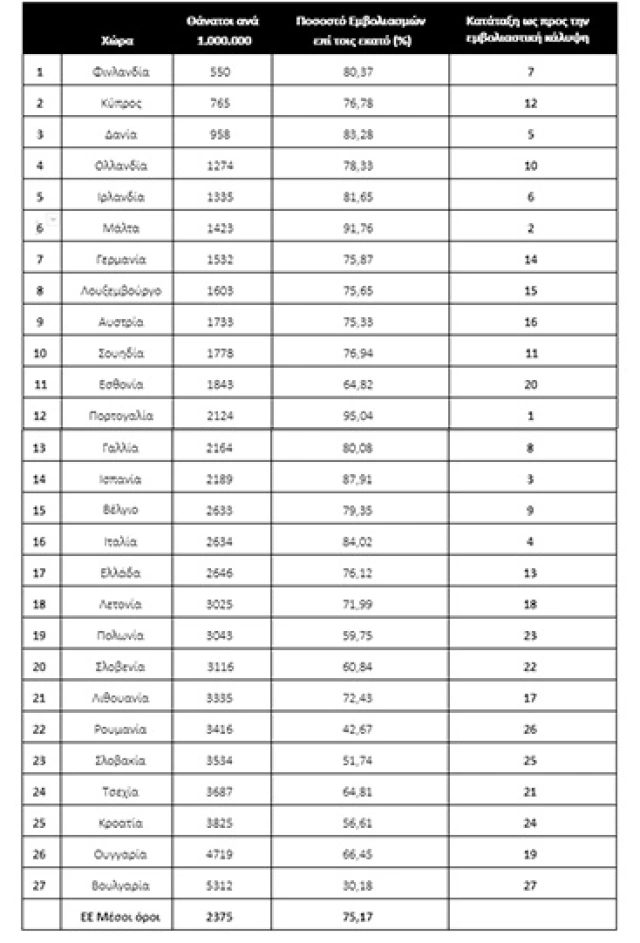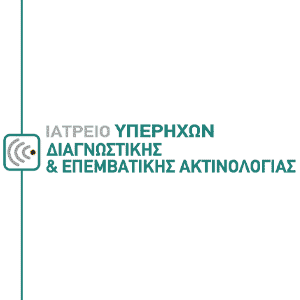Κοντά δυο χρόνια η πανδημία μονοπώλησε το ενδιαφέρον των ΜΜΕ, των social media και φυσικά της κοινής γνώμης μέχρι που εκτοπίστηκε από την ενεργειακή κρίση, το κύμα ακρίβειας και στη συνέχεια την εισβολή στην Ουκρανία
Είναι ίσως η πιο κατάλληλη στιγμή ενός νηφάλιου απολογισμού και εξαγωγής συμπερασμάτων από την περιπέτεια της πανδημίας χωρίς την ένταση της θερμής περιόδου.
Το γεγονός ότι η πανδημία υπήρξε όντως παγκόσμια δεν αποτελεί λόγο εφησυχασμού, τουναντίον ο γενικευμένος χαρακτήρας της είναι ιδιαίτερα χρήσιμος καθώς η πανδημία ανέδειξε θετικές πλευρές και φανέρωσε αδυναμίες που μπορούν να αξιολογηθούν με τη μέθοδο της σύγκρισης.
Το πεδίο σύγκρισης για την Ελλάδα δε μπορεί παρά να είναι η Ευρωπαϊκή Ένωση και η θέση μας ανάμεσα στα Κράτη-Μέλη της για λόγους προφανείς. Η ολοκληρωμένη επιστημονική δουλειά των ειδικών είναι βέβαιο ότι μπορεί να μας διαφωτίσει πλήρως, παρέχοντας παράλληλα τα απαραίτητα εργαλεία στην πολιτεία και τους θεσμούς της να λάβουν αποφάσεις.
Το κεντρικό ερώτημα αναμφίβολα αφορά το μέλλον του Ε.Σ.Υ. και γενικότερα των δημόσιων δομών υγείας και εκεί θα εστιαστεί ο δημόσιος διάλογος που αργά ή γρήγορα θα ξεκινήσει.
Με τη γλώσσα ωστόσο των αριθμών και χωρίς παρωπίδες αξίζει να μελετήσουμε τον πίνακα που παρατίθεται γιατί οδηγεί με ασφάλεια σε σημαντικά συμπεράσματα.
Ο πίνακας δείχνει την κατάταξη των χωρών της ΕΕ αφενός ως προς τους θανάτους και αφετέρου ως προς τον εμβολιασμό. Οι δείκτες που χρησιμοποιήθηκαν είναι κοινά αποδεκτοί (θάνατοι ανά εκατομμύριο κατοίκων και ποσοστό του γενικού πληθυσμού που έλαβε τουλάχιστον μια δόση).

Όπως βλέπουμε, η Ελλάδα στο δείκτη θανάτων βρίσκεται πάνω από το μέσο όρο της ΕΕ κατατασσόμενη στη 17η θέση, ενώ στον εμβολιασμό είναι επίσης πάνω από το μ.ο. της ΕΕ και στη 13η θέση. Όσοι παρακολουθούν συστηματικά την εξέλιξη των δεικτών σε ημερήσια βάση γνωρίζουν ότι η κατάταξη της χώρας μας δεν πρόκειται να αλλάξει και μάλιστα ως προς τους θανάτους η απόσταση μας από τους αμέσως «καλύτερους» μας, Ιταλία και Βέλγιο, δυστυχώς θα μεγαλώσει.
Η βασική παρατήρηση από την κατάταξη είναι ότι οι χώρες που προηγούνται της Ελλάδας στο δείκτη θνησιμότητας, πλην της Εσθονίας, αποτελούν κατά τεκμήριο το σκληρό πυρήνα της ΕΕ, ενώ αντίθετα οι χώρες που έπονται είναι τα νεότερα Κράτη-Μέλη της ΕΕ και πριν την ένταξη τους ήταν χώρες του «υπαρκτού σοσιαλισμού» ή της πρώην Ανατολικής Ευρώπης.
Μοιάζει να χωρίζεται η ΕΕ σε δυο ευδιάκριτες ομάδες με την Ελλάδα ακριβώς στη μέση και αυτό πρέπει να αξιολογηθεί γιατί δεν είναι τυχαίο.
Στην πρώτη ομάδα υπάρχουν τρία κοινά χαρακτηριστικά σε σύγκριση με την Ελλάδα:
-Έχουν μεγαλύτερο κατά κεφαλή ΑΕΠ.
-Είναι χώρες του μεταπολεμικού θαύματος του ευρωπαϊκού κράτους πρόνοιας. Αυτό δεν αφορά Ισπανία και Πορτογαλία, ενώ ισχύει για χώρες εκτός ΕΕ ( Μεγάλη Βρετανία, Νορβηγία, Ελβετία ).
-Παρουσιάζουν αισθητά μεγαλύτερη δημόσια δαπάνη για την υγεία έναντι της ιδιωτικής σε σχέση με εμάς που σημαίνει πιο ανθεκτικά δημόσια συστήματά υγείας.
Στη δεύτερη ομάδα υπάρχουν δυο κοινά χαρακτηριστικά πάντα σε σύγκριση με την Ελλάδα:
-Η διαδικασία μετάβασης αυτών των χωρών στη φιλελεύθερη δημοκρατία δεν υπήρξε ευθύγραμμη με υπαρκτά κενά στη λειτουργία των κρατικών δομών, άρα και των συστημάτων υγείας.
-Εμφανίζουν όλες ανεξαίρετα χαμηλότερα έως πολύ χαμηλότερα ποσοστά εμβολιασμού από το μέσο ευρωπαϊκό όρο και βέβαια από την Ελλάδα.
Όπως προκύπτει από την αλήθεια των αριθμών το τελικό αποτέλεσμα, μετρούμενο σε απώλειες ανθρώπων για όλες τις χώρες, είναι η συνισταμένη της ανθεκτικότητας του δημοσίου συστήματος υγείας και του ποσοστού εμβολιασμού. Οι συγκριτικά καλύτερες επιδόσεις των βόρειων χωρών προφανώς σχετίζονται με την απαραίτητη κοινωνική αποστασιοποίηση όπου υπερτερούν έναντι των νοτίων, αλλά πρόκειται για παράμετρο βαθιά ριζωμένης νοοτροπίας και συμπεριφοράς που ήταν αδύνατο να αλλάξει με την πανδημία.
Η κατάταξη της Ελλάδας οφείλει να μας προβληματίσει και μάλιστα διπλά, με δεδομένες τις πολύ καλύτερες επιδόσεις των χωρών της Ιβηρικής. Είμαστε τρεις χώρες του Νότου με σχεδόν ταυτόχρονη ένταξη στην ΕΕ και ιστορικά η μεταπολεμική οικοδόμηση του κράτους πρόνοιας στην Ευρώπη δεν μας συμπεριέλαβε. Η μεγάλη εμβολιαστική κάλυψη στην Ιβηρική είναι ο ένας λόγος της απόστασης μας σε θανάτους, γεγονός που αποτελεί κόλαφο για τους κάθε είδους αρνητές στη χώρα. Η πλήρης μελέτη όμως των στοιχείων μας δείχνει ότι όσο απαραίτητη είναι η δημόσια συζήτηση για την πορεία του εμβολιασμού, άλλο τόσο θα είναι τραγικό λάθος να περιοριστεί εκεί.
Η αποφασιστική αναβάθμιση του ΕΣΥ προκύπτει αβίαστα ως εθνική προτεραιότητα που δεν παίρνει αναβολή και ενισχύεται από πραγματικά δεδομένα.
Η απόσταση μας από τις χώρες που προηγούνται είναι αισθητά μεγαλύτερη από ότι φαίνεται λαμβάνοντας υπόψη το μεγάλο αριθμό θανάτων που σημειώθηκε στην αρχική φάση της πανδημίας στα γηροκομεία χωρών όπως Ισπανία, Γαλλία, Βέλγιο, Σουηδία, Ιταλία κλπ. Στην Ελλάδα αντίθετα η οικογένεια αποδείχθηκε ασπίδα προστασίας των ηλικιωμένων την ίδια περίοδο. Από τις αρχές Ιουνίου 2020 όταν έγινε πλήρης άρση του lockdown στην ΕΕ και μέχρι σήμερα, η θέση μας ως προς τους θανάτους διαρκώς επιδεινώνεται σε σύγκριση με τις χώρες που διαθέτουν ανθεκτικότερα δημόσια συστήματα υγείας. Στην αναβάθμιση του ΕΣΥ φαίνεται να υπάρχει μια γενικότερη συμφωνία, αλλά στα λόγια.
Όπως ήδη σημειώθηκε, η ανθεκτικότητα των δημοσίων δομών υγείας συνδέεται άρρηκτα με τη σχέση μεταξύ δημόσιας δαπάνης για την υγεία και ιδιωτικής. Η ιδιωτική δαπάνη στην Ελλάδα είναι κοντά στο 40% με την Ιταλία να ακολουθεί λίγο κάτω από το 20%. Σε όλες τις άλλες χώρες του πίνακα που προηγούνται της Ελλάδας, επίσης και της Ιταλίας, η ιδιωτική δαπάνη βρίσκεται κάτω του 15% και σε κάποιες το ποσοστό είναι μονοψήφιο.
Προξενεί τουλάχιστον εντύπωση το γεγονός ότι η κυβέρνηση Ντράγκι στην Ιταλία προφανώς εντόπισε το πρόβλημα και διαθέτει το 10% των πόρων του Ταμείου Ανάκαμψης για την αναβάθμιση του δημοσίου συστήματος υγείας, όταν στην Ελλάδα η κυβέρνηση έχει προβλέψει αντίστοιχα μόλις το 4%. Με τις αλλεπάλληλες κρίσεις των δυο τελευταίων ετών παρούσες, το μείζον ερώτημα που καλούμαστε να απαντήσουμε όλοι δεν είναι ποιοι θα συνεργαστούν με ποιους και πόσες διαδοχικές εκλογές θα χρειαστεί να γίνουν για αυτό, αλλά πως στεκόμαστε σε ένα διαχρονικό ερώτημα:
Τελικά, μαθαίνουμε από τις κρίσεις;





























